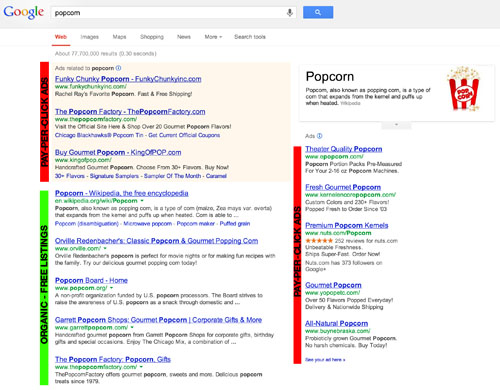If you have a website or eCommerce store, you probably have an intense hatred towards Google. Just the words “panda” or “penguin” strikes fear in you to the point where you can’t watch Animal Planet anymore.
For those of you who don’t know what the heck I’m talking about, here’s the skinny.
Website owners work hard everyday to get their site listed in the search engines. When you type something into Google or Bing or whatever search engine you use, you’re presented with two types of listings: 1) the paid ones which you’ll find at the top and side of the screen and 2) the free ones which we refer to as “organic” listings:

Since none of us like to spend a ton of money on paid placement, we try very hard to get our site listed in page one or two of the organic listings. After all, free is good, right?
Of course it is, and that’s why so many people hate Big G.
Over the past year, Google has released updates to their search algorithm in an effort to provide searchers with what they consider the best possible results to their search query. These updates were given the name Panda and Penguin, but to site owners, they’re simply called Satan.
Google’s efforts to provide that optimum search experience resulted in many stores and websites losing their free listings completely or getting bumped so far back in the results that searchers can’t even stumble upon their listing.
Site owners, for years, have tried to fool the system in order to get those coveted free listings. Having been fortunate enough to be selling online since 1994, I’ve seen (and partaken in) several attempts at getting on page one.
I remember loading up my websites with big fonts, bold text, white copy on white background, and other funky stuff in order to trick the engines. When pay-per-click advertising came on the scene, many of those things that used to get us good ranking suddenly stopped working and we had to pay-to-play.
As the search engines got smarter, we as site owners had to get smarter as well. We found new ways to capture good ranking such as hiring companies to do “link building” for us which basically meant some guy in India spent 23 ½ hours a day putting links to our sites on crappy websites.
Then came the march of the penguin and his friend the panda. Two of the biggest changes to hit the search engines since pay-per-click landed on the scene. The crackdown on everything we did in the past to fool the system was on. Many big retailers took major hits. Many smaller eCommerce stores went out of business. Some made it but have never been able to recover their organic rankings.
So who do we blame?
Those who were impacted by Google’s Penguin and Panda updates may find it easy to point their finger and say, “you screwed me.” But is Google to blame?
I’m all for Google’s mission of providing users with an optimal search experience.
I’m also for fairness.
If you got knocked down a peg or two by the Google updates, chances are you were doing something you weren’t supposed to be doing in the first place – like bad link building. Or, you may have been hit because of duplicate content, something I’ve talked about time and time again here on my blog.
Exactly what Google has penalized sites for we can only speculate, but chances are they didn’t and don’t continue to punish stores and websites for doing things correctly.
So what do I mean by “doing things correctly?” Well, here are some things that you should be doing that’s not only good for your search engine results but for you and your customers as well:
- Provide good, quality content in the form of unique item descriptions that sound natural when read aloud and give the customer enough detail about the product so they can form an educated opinion on whether to purchase it or not. And remember, don’t stuff keywords into item or section page descriptions thinking it will help you rank better. It won’t.
- Have a blog for your eCommerce store where you talk about your products, industry trends, tips for your product’s end users, etc. Your posts should be informative, not spammy, not keyword laden and interesting enough that your readers will want to share them on their favorite social media websites.
- Be active in social media! Yes, don’t be afraid of Facebook, Twitter, Google+ or the other popular social media sites out there. In a recent SEO webinar, Duane Forrester of Bing revealed that social media is indeed a factor that is used to determine rank. The more people share, like and comment on your posts and tweets the better.
- Become an authority in your field of expertise. If you’re selling popcorn popping machines, you can probably work one of them in your sleep and explain the in’s and out’s of them like you’re talking about sunshine on a beautiful day. Brand yourself as the expert in your industry by asking to write guest posts on relevant, quality blogs with a link back to your website but don’t make it a sales pitch. Make it an article people will want to read, comment on and share with their friends. Do the same on your own blog too!
These days the sites that provide a good user experience for their customers are the ones that are going to rank high in the organic listings. The days of fooling Google and the others is over, so stop trying to!
If you build out your website to include plenty of useful content that your customers and site visitors are going to find useful and share, you’re doing your job.
